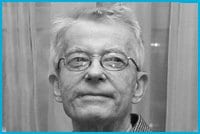Strip! God is making an inspection
Your nipples grow erect as he nears.
He made you wait, beg for his attention.
He is playing with his creation.
John Grube’s poem “Finale,” published in God, Sex and Poetry
This month poet and artist John Grube passed away at the age of 77 of Parkinson’s-related causes after a year of being seriously ill. He was perhaps best known within the Toronto queer scene as one of the members of gay art collective JAC — along with Alex Liros and Clarence Barnes — which documented gay events, demonstrations and early Pride marches in Toronto in the 1980s.
Born in Toronto to father George G Grube, a professor of classics at U of T’s Trinity College, and mother Gwenyth Grube, John followed in his father’s footsteps to become a career academic, teaching English at the University of Windsor and later creative writing at the Ontario College of Art (now the Ontario College of Art and Design), where he worked for more than 20 years.
I first met Grube in 1970 and we remained good friends until his death. We spoke almost daily for more than 30 years. He was a passionate and opinionated individual who inspired mixed feelings in many, but there’s no doubt that he cared deeply about our community and its institutions.
Grube first became an activist in the late 1960s when he helped to organize a protest in support of a Jewish professor fired from the University of Windsor. But it wasn’t until the Toronto bathhouse raids in the 1980s that Grube came out publicly as a gay activist.
I recall being with him at a protest against antigay crusader Anita Bryant in 1979. There were some high-profile speakers, including Margaret Atwood, and a fair number of reporters. Grube was nervous about being there; at that time he didn’t want to be recognized as an OCA professor nor identified by the media as a gay man.
The raids in 1981 changed all that. From that time on Grube was quite outspoken as a gay activist, becoming the unofficial spokesperson for the JAC collective and publishing the essay “No More Shit,” which dealt with the troubled relationship between gay men and the police force.
Grube’s experiences and obsessions found their way into his poetry and fiction. In his 1997 book of short fiction, I’m Supposed to Be Crazy and Other Stories, there are echoes of his own life including stories set around the bathhouse raids and a prof fired from the University of Windsor. Similarly in his 2002 book of poetry God, Sex and Poetry he explored situations and subjects from his own life and the lives of those close to him. One of his poems — in which a young man is shamed by his father in front of his grandmother for being a hustler — was included in the anthology Seminal, the first collection of Canadian gay poetry, published last year by Arsenal Pulp Press. A devout Anglican, Grube’s poetry often combined eroticism and theology, as in the poem “Finale.”
Grube advocated for mentorship between older and younger gay men not for sex, though attraction was certainly a part of it. He enjoyed the challenge of dealing with young people and was invigorated by their energy. When he retired in the early ’90s he soon found he missed that dynamic and spent a few years volunteering with the Toronto District School Board’s Triangle Program.
He was also an advocate for older homos, participating in Gays and Lesbians Aging in the ’90s and leading an oral history project called Foolscap which interviewed scores of older gay activists. Some of his findings were published in the Journal of Homosexuality in 1991 under the title “Natives and Settlers: An Ethnographic Note on Early Interaction of Older Homosexual Men with Younger Gay Liberationists.”
Grube was an avid conspiracy theorist who often interpreted world events, from the FLQ crisis in Quebec in 1970 to the 2001 World Trade Center disaster, through a conspiracy theory model, often with the CIA emerging as one of the principal sinister forces. But for all that he could get carried away with his theories Grube had a brilliant, inquiring intellect. As lifelong friend Malcom Ferrier put it, “He’d never let a subject go until he examined it, wrung it out and illuminated it for all of us.”
Although Grube could be quite exasperating he could also be very supportive, encouraging many to be true to themselves, particularly where their work was concerned. He was the one to encourage me to give up a career in academia and become a journalist in the 1970s.
“John was an early and encouraging advisor on some of my very first forays into fiction writing, aside from our various social encounters over the years,” states novelist and Xtra book reviewer Jim Bartley. “[He was] a lovely man with a ready dry wit barbed when needed that was sometimes easy to miss.”
“It saddens me greatly to think we have lost John,” states activist and politico Bob Gallagher, who was one of the founders of the Foundation for Equal Families. “While I had not kept up with him in recent years, I often thought of him. He made a very profound impact on me probably much more than he realized. Our conversation on the concept of community and identity and political action were seminal events in my thinking and development.”
Grube is survived by two sisters — Jenny Podlecki of Vancouver and Toni Swalgen of Long Island, NY — as well as many freinds, nephews and neices, and by his friend and mentoree Mark Hart. At his request, Grube’s remains were cremated and will be scattered about one of Toronto’s gay landmarks.

 Why you can trust Xtra
Why you can trust Xtra


